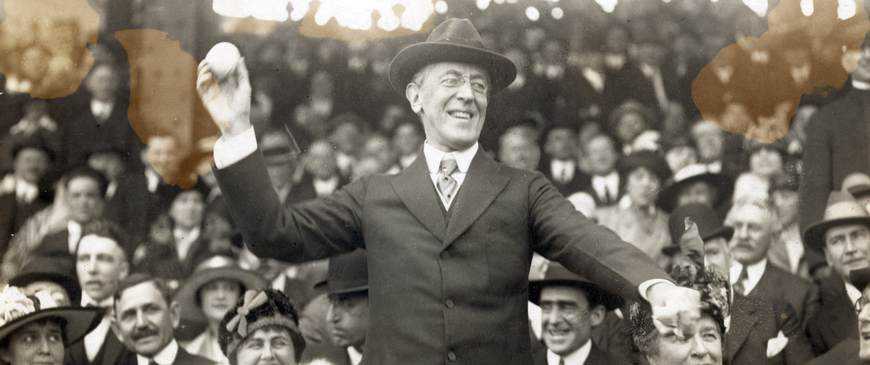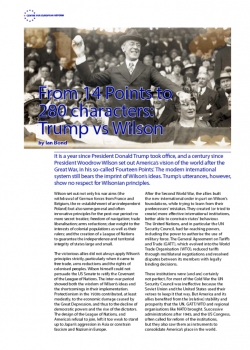
From 14 points to 280 characters: Trump vs Wilson
Woodrow Wilson's 14 points of January 1918 were the first sketch of the liberal, rules-based international order. A century later, Donald Trump risks demolishing the edifice.
It is a year since President Donald Trump took office, and a century since President Woodrow Wilson set out America’s vision of the world after the Great War, in his so-called ‘Fourteen Points’. The modern international system still bears the imprint of Wilson’s ideas. Trump’s utterances, however, show no respect for Wilsonian principles.
Wilson set out not only his war aims (the withdrawal of German forces from France and Belgium, the re-establishment of an independent Poland) but also some general and often innovative principles for the post-war period: no more secret treaties; freedom of navigation; trade liberalisation; arms reductions; due weight to the interests of colonial populations as well as their rulers; and the creation of a League of Nations to guarantee the independence and territorial integrity of states large and small.
The modern international system still bears the imprint of Wilson’s ideas, but #Trump shows no respect for them.
The victorious allies did not always apply Wilson’s principles strictly, particularly when it came to free trade, arms reductions and the rights of colonised peoples. Wilson himself could not persuade the US Senate to ratify the Covenant of the League of Nations. The inter-war period showed both the wisdom of Wilson’s ideas and the shortcomings in their implementation. Protectionism in the 1930s contributed, at least modestly, to the economic damage caused by the Great Depression, and thus to the decline of democratic powers and the rise of the dictators. The design of the League of Nations, and America’s refusal to join, left it too weak to stand up to Japan’s aggression in Asia or constrain fascism and Nazism in Europe.
After the Second World War, the allies built the new international order in part on Wilson’s foundations, while trying to learn from their predecessors’ mistakes. They created (or tried to create) more effective international institutions, better able to constrain states’ behaviour. The United Nations, and in particular the UN Security Council, had far-reaching powers, including the power to authorise the use of military force. The General Agreement on Tariffs and Trade (GATT), which evolved into the World Trade Organisation (WTO), reduced tariffs through multilateral negotiations and resolved disputes between its members with legally binding decisions.
These institutions were (and are) certainly not perfect. For most of the Cold War the UN Security Council was ineffective because the Soviet Union and the United States used their vetoes to keep it that way. But America and its allies benefited from the (relative) stability and prosperity that the UN, GATT/WTO and regional organisations like NATO brought. Successive administrations after 1945, and the US Congress, often called for reform of the institutions, but they also saw them as instruments to consolidate America’s place in the world.
Trump is the first President to regard the post-1945 rules-based system as inimical to US interests. Not for him Wilson’s search for international security and prosperity through institutions: his focus is narrowly national. He speaks of “this beautiful vision – a world of strong, sovereign and independent nations” and “a balance of power that favours the United States, our allies and our partners”. He reportedly told his senior military and political advisers in July 2017 that he wanted to rebuild the US nuclear force to its maximum size in the Cold War – even though the US already has over 5,000 warheads deployed or stockpiled, more than enough to obliterate any enemy. In his first speech to the UN General Assembly, in September 2017, he repeatedly stressed the importance of sovereignty and urged other leaders, like him, to “put your countries first”. As Noah Gordon argued in a CER insight (‘Trump’s trade policy: Separating the normal from the dangerous’), Trump is not the first president to try to reduce the US trade deficit by protectionist steps, but his hostility to free trade and to US partners who run trade surpluses goes further. He has undermined and threatened to ignore the WTO.
In the last year, there has often been a gap between the president’s rhetoric – above all his tweets taunting adversaries and threatening conflict – and the actions taken by his administration. For all his reluctance to restate US commitment to NATO’s mutual defence guarantee, the Pentagon has put more resources into defending Europe. Despite Trump’s bellicose language and personal insults directed at North Korea’s leader, Kim Jong-Un, Secretary of State Rex Tillerson has indicated that the US would be ready to talk to Pyongyang, without preconditions.
However his officials mitigate the harm, #Trump is damaging the international system built by his predecessors.
But, however his officials mitigate the harm, Trump is damaging the international system built by his predecessors. Even before Trump, countries like Russia were giving up on the rules-based order in favour of an older style of balance-of-power politics, and the ability to coerce neighbours in bilateral disputes. If the leader of the nation that designed most of the main international institutions has lost confidence in their ability to protect American interests, then the world is moving into a dangerous period.
Perhaps countries like China, Russia and the US can flourish in a world where might is once again right. The EU and its member-states, and other like-minded countries like Canada or Japan, cannot. They must make the case for Wilsonian order, not Trumpian anarchy, even if it takes them more than 280 characters.
Ian Bond is director of foreign policy at the Centre for European Reform.

